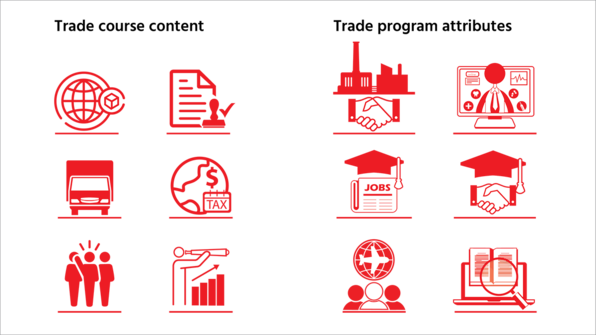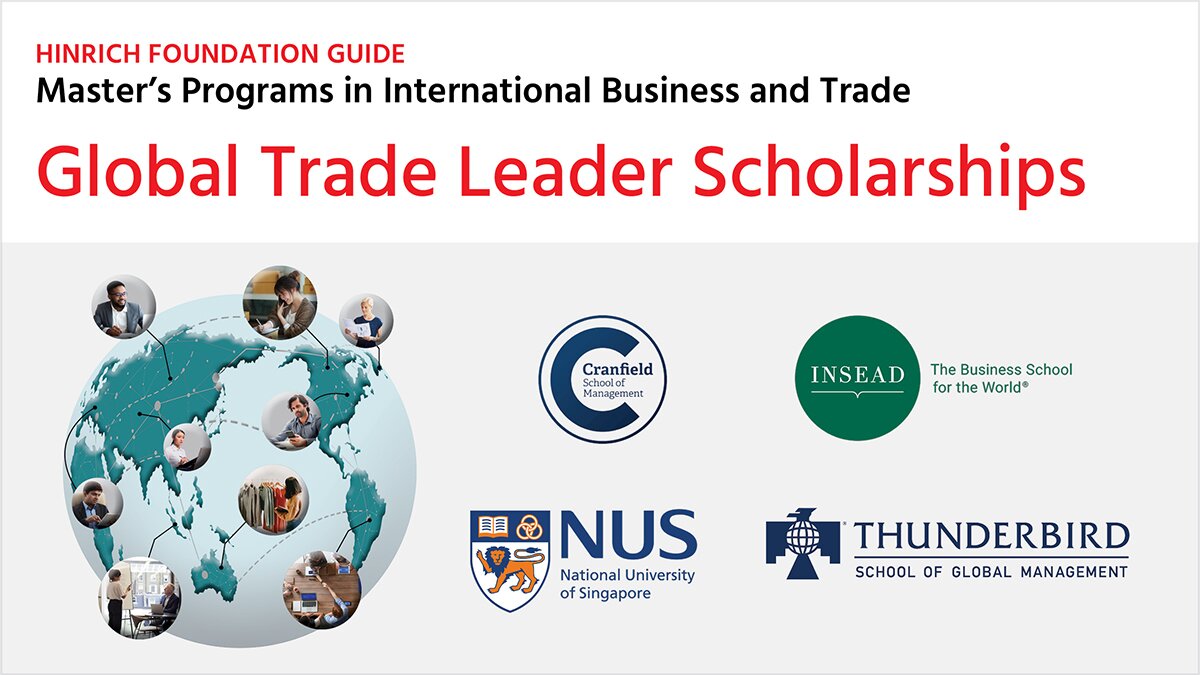
HINRICH FOUNDATION GUIDE
12 criteria of great master’s programs
The Hinrich Foundation Guide reflects input from trade business leaders across global value chains and insight from academics.
When evaluating a program, make sure it meets these 6 trade course content criteria and 6 trade program attributes.

Building leadership in trade
TRADE COURSE CONTENT
Prospective students should confirm that master’s programs have the trade course content to develop the skills that employers need. The curricula must provide a framework that prioritizes the learning of:
- Cross-border trade
- Cross-border trade policy
- Cross-border logistics & supply chain management
- Cross-border trade finance & accounting
- Cross-border leadership & soft skills
- Future skills for global trade
- Cross-border trade
- Cross-border trade policy
- Cross-border logistics & supply chain management
- Cross-border trade finance & accounting
- Cross-border leadership & soft skills
- Future skills for global trade

Cross-border trade

Understanding cross-border trade is fundamental to mastering international business. Courses in this area must develop a framework that is applicable to real-life international trade for you to understand and develop:
- Market entry strategies to expand business into new markets
- Sustainable and ethical business practices for profitable sourcing
- Procurement, distributor and supplier management in the supply chain ecosystem
- Vendor relations skills for effective cost management
- International sales and negotiation skills supplemented with traditional and digital marketing, digital sales and e-commerce
Proficiency in these topics prepares students to navigate the complex and evolving world of global trade.

Cross-border trade policy

Cross-border trade policy shapes the rules and frameworks governing international commerce. Look for courses that will develop your understanding of complex geopolitical issues surrounding:
- The development and underlying objectives of key trade frameworks, agreements and practical implications of, for example, the WTO, USMCA, RCEP and CPTPP, among many others
- How domestic politics and geopolitics influence business and trade systems, including domestic protectionism
- The impact on commerce of tariffs, non-tariff barriers, sanctions, protectionism, domestic industry policy and global events
- Macroeconomic factors like exchange rates and comparative advantage
- The role of trade in international development and economic growth
With this foundation, graduates gain the skills to navigate complex geopolitics, trade regulations and policies worldwide.

Cross-border logistics & supply chain management

Understanding the challenges and opportunities presented by logistics and supply chain management is critical for successful global trade operations. Course content and real-world case studies in this area will develop your understanding of:
- “Whiteboard to delivery” view of international supply chain coordination and strategy
- Transportation, freight forwarding, customs clearance and multimodal shipping
- Big data analytics, visualization and predictive forecasting
- Manufacturing management abroad, including localization and quality control
- The importance and implications of Incoterms and trade documentation
These skills enable graduates to understand what is required to build resilient and efficient global supply chains.

Cross-border trade finance

Understanding the complexities of trade finance and accounting is vital for managing international transactions and compliance. Core understanding that a quality master’s program will provide through real-world business contexts includes:
- Import-export finance instruments, such as letters of credit, export credit insurance and factoring
- International accounting, taxation, transfer pricing and tax treaties
- Impacts of fluctuating currency exchange rates
- Financial reporting, governance and ESG compliance
- Customs, tariffs, classification, valuation and trade remedies
- International trade law, arbitration and intellectual property rights
- Risk management and mitigation
Through these topics, graduates become familiar with the financial and legal complexities of cross-border trade.

Cross-border leadership & soft skills

Developing strong leadership and soft skills is essential for managing diverse global teams and addressing the challenges inherent in cross-border business.
To build your own foundations for leadership, look for courses and international project work – including consultancy assignments and internships – that help you to master:
- Interest in, and appreciation for, cross-cultural understanding and collaboration
- Self-awareness and openness to culturally sensitive leadership capabilities, including cross-cultural listening and communication skills
- Critical thinking and international strategic planning acumen
- Global talent recruitment, development and retention capabilities
Choose a program that provides real-world business exposure and nurtures in you a mindset shift to help you develop adaptability, embrace change, drive innovation and thrive in dynamic global environments.

Future skills for cross-border trade

Learning to adapt to rapidly evolving technology by developing an innovation-ready mindset is critical. The teaching approach and course content must prepare you to explore and embrace emerging technologies and digital tools throughout your career.
Ensure your program lays a strong foundation for leveraging future technology by integrating exposure to key areas such as:
- Artificial Intelligence and machine learning for analytics and automation
- The Internet of Things and sensor technologies for real-time logistics tracking
- Data analytics, visualization, cloud computing and cybersecurity
- Blockchain, distributed ledger technologies, cybersecurity and cryptocurrency for enhanced supply chain traceability, data security and secure digital transactions
Developing these competencies equips graduates to innovate continuously and sustain a competitive advantage in the rapidly evolving digital trade landscape.
TRADE PROGRAM ATTRIBUTES
Prospective students should confirm that master’s programs demonstrate excellence across six core trade program attributes to develop the skills, knowledge and networks for career success. These attributes are:
- Industry aligned curriculum & engagement
- Practitioner professors
- Career services & employer recruitment
- Alumni support & network
- International exposure
- Leading research
- Industry aligned curriculum & engagement
- Practitioner professors
- Career services & employer recruitment
- Alumni support & network
- International exposure
- Leading research
Ensuring your program embodies these attributes will equip you with the practical expertise and global perspective needed to secure employment upon graduation and succeed in today’s complex trade environment.

Industry aligned curriculum & engagement

Graduate programs in global trade must prioritize strong industry engagement for a curriculum and learning environment that blends academic theory with real-world practice. This prepares graduates with the skills that employers need through:
- Industry sponsorships to support academic programs and events, fostering partnerships between universities and businesses, creating direct links for students
- Learning from guest speakers from companies and trade organizations which offers students valuable insights into current challenges and upcoming trends
- Collaborative research projects that enable students to develop innovative solutions in areas across global trade value chains
- Working with employers, other students and professors to develop innovative, practical solutions to real industry challenges
- Undertaking internships at multinational firms and trade agencies
When selecting your master’s program in trade, confirm that it embeds strong industry engagement initiatives. This will ensure that you are well-equipped to thrive in the ever-changing complex world of international commerce.

Practitioner professors

Professors with real-world experience in global trade bring invaluable industry experience and expertise to the classroom that will enhance your education outcomes. Benefits include:
- Real-world insights into international trade practices, challenges and emerging trends based on professors’ years of experience in non-academic, front-line trade roles
- Learning that is more relatable and practical by incorporating actual case studies as professors share specialized knowledge and best practices directly relevant to global business
- Opportunities for guest lectures, collaborations and employment through their industry connections
- Mentorship and career guidance support from professors to ensure students are well-prepared to navigate the complex realities of international trade upon graduation
Confirm that your program will be taught by practitioner professors. This will enrich your learning by bridging theory and practice, equipping you with the skills, insights and networks essential for success in the dynamic field of global trade.

Career services & employer recruitment

When selecting your master’s program in international business, ensure that it includes strong career services and employer engagement initiatives, as evidenced by an extensive list of companies actively recruiting graduates from the program.
Robust recruiting signals employer confidence that the curriculum prepares students effectively for success in the international workforce. Key components to look for in quality master’s programs include:
Career advising
Guidance on resume writing, interview techniques and job search strategies tailored to international trade roles
Employer recruiting
Participation of reputable international trade-related companies in recruitment events, job fairs and placement initiatives providing students with direct access to internships and job opportunities
Job portals & recruitment fairs
Platforms and events that connect students with global trade employers
Mentorship programs
Pairing students with industry professionals for personalized career insights and guidance
Career services and employer relationships help students to secure employment upon graduation and advance their careers well into the future.

Alumni support & network

A strong international business and trade master’s program is reflected in the leadership success of its graduates and the strength of its alumni network. When evaluating programs, look for:
Alumni network
A vibrant alumni community actively supported by the university fosters valuable lifelong connections and business opportunities among graduates worldwide
Alumni engagement programs
Universities that offer dedicated alumni services such as mentorship programs, career workshops and networking events help graduates continuously develop professionally and stay connected
Ongoing career support
Strong alumni support includes access to job placement assistance, industry insights and exclusive opportunities that empower graduates to thrive in the evolving global business landscape
Alumni leadership advancement
Graduates who advance into senior leadership roles showcase the program’s ability to prepare professionals for high-level global trade positions
The cohesion of the alumni community and success of alumni in influential roles confirms the quality of the curriculum, teaching and industry engagement. Backed by proactive university initiatives, these factors demonstrate the program’s excellence and dedication to successful student outcomes throughout their careers.

International exposure

A global trade master’s program should have a balanced mix of students from many countries to foster a truly international learning environment. It should also offer overseas study opportunities as part of the curriculum. Key benefits include:
- Exposure to diverse cultural perspectives that enhance global understanding, adaptability and self-awareness
- Preparation for working effectively in multicultural teams and international settings
- Opportunities to build broad, international professional networks
- Promotion of inclusivity and cross-cultural leadership skills
Choosing a program with a well-rounded, diverse student body and overseas learning experiences enriches your education to better equip you for success in global trade.

Leading research

The quality and influence of an institution’s publications showcase its dedication to advancing higher-level knowledge. When choosing graduate programs, prospective students should examine faculty publication output and citation impact – most notably in international business and trade topics – as these reflect expertise, research focus and scholarly influence.
Highly cited research in areas such as trade policy, logistics, finance and technology in respected journals shows faculty thought leadership, indicating their ability to deliver forward-thinking teaching.
A strong research publishing culture attracts top scholars, creating a vibrant intellectual community. Students also gain opportunities to collaborate on research and co-author papers, enhancing their research skills, insight and academic credentials.

Industry aligned curriculum & engagement

Cost & financial aid
⌃
Besides the Hinrich Foundation Guide criteria, we acknowledge that there are other factors that should be considered when evaluating a master’s program that’s right for you. We have included more questions to ask in the Guide.
Realize your full potential in global trade
Realize your full potential in global trade
- Study a master’s at a leading university
- Secure corporate sponsorship to access a Hinrich Foundation scholarship of up to US$25,000
- Develop industry connections for your career success
- Expand your professional global network



















